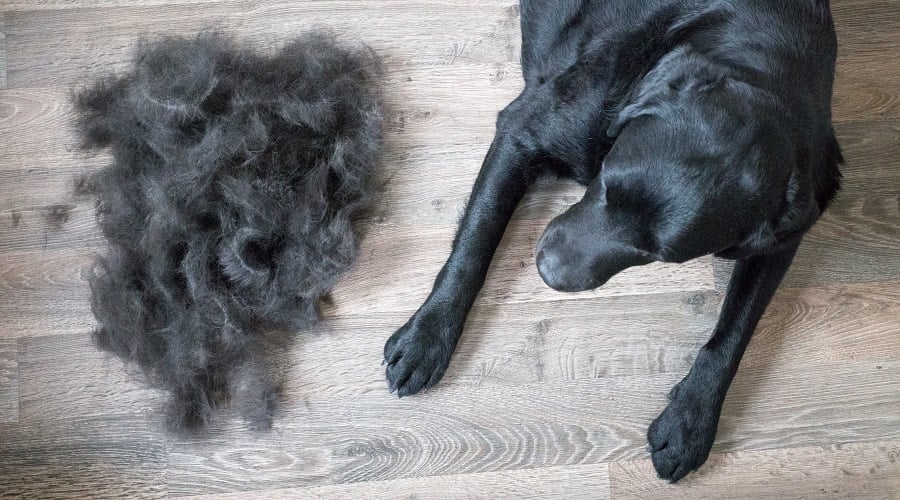Dogs Love Peanut Butter… But Is It Really Safe?
When you purchase through links on our site, we may earn a commission. Here’s how it works.
If your dog could write poetry, it would be an ode to peanut butter. Something like: “Oh, you sticky spoon of golden goo, I would fight a raccoon just to taste you.” It’s no secret: dogs love peanut butter, like, really love it.
Table of Contents
There’s just something about it that makes them lose all sense of dignity. They smell it from rooms away. They sit before you’ve even said a word. Some dogs practically teleport into the kitchen the moment the jar opens.
But why do dogs love peanut butter so much?
Is it the taste? The smell? A primal craving passed down from their wild ancestors? Or are they just in it for the bribe?
We’re digging into the science, the snackology, and the sticky truths behind this canine craving. Plus, we’ll cover how to feed it safely, how much is too much, and how to avoid turning treat time into a trip to the vet.
Peanut Butter Madness: Watch the Chaos Unfold
Do you think your dog’s peanut butter obsession is intense? Trust us, they’re in good company. Watch these pups go full drama mode over a spoonful.
Peanut Butter Fiends: Stories From the Front Lines
Every pup has its thing. Some are obsessed with tennis balls. Others won’t rest until they’ve conquered every squeaky toy in sight. But our dogs? They’re ride-or-die for peanut butter.
From Falkor the leg-climbing Poogle to jar-detecting snack ninjas, these stories prove just how far our furry friends will go for a taste.
Falkor the Peanut Butter Stalker
At our house, peanut butter is basically a dog siren. One twist of the jar lid and Falkor is there, charging into the kitchen like a caffeinated squirrel in a wind tunnel.
Falkor is a 25-pound Poogle with the energy of a toddler who just discovered pixie sticks. And when it comes to peanut butter? He has no self-control and even less respect for personal space. He will scale your leg like a mountain goat on a mission. We’ve learned to only open the jar if we’re ready to share. Or defend ourselves.
– Danielle DeGroot, Falkor’s Person & Canine Journal Writer

Rio the Golden Retriever: Master of the Peanut Butter Guilt Trip
My Golden Retriever, Rio, is completely obsessed with peanut butter. Specifically, peanut butter in his Kong. He knows exactly where it’s stored and will stand by the drawer, giving me the saddest eyes you’ve ever seen.
If I say no, he grumbles. Actually grumbles. Then comes the head shake—like he’s genuinely offended I’ve denied him his favorite thing.
It’s honestly hilarious. If it we1ren’t so adorable, I’d probably be more firm. But there’s just something about a dog politely throwing a tantrum over peanut butter that’s hard to resist.
– Tara Maurer, Rio’s Human & Canine Journal Writer

Peanut Butter Isn’t Just a Treat. It’s a Lifestyle.
To your dog, peanut butter isn’t food. It’s a full-body experience. It’s treat time, pill-hiding magic, crate bribery, and emotional support snacks all in one scoop.
Dogs don’t just eat peanut butter. They perform it. It’s theater, from head tilts to zoomies to licking the roof of their mouth like they’re solving quantum physics.
Do Dogs Even Taste Peanut Butter, Or Just Smell Their Way to Heaven?
Before we get into peanut butter mania, let’s talk taste buds. Dogs don’t experience food the same way we do.
Humans have around 9,000 taste buds. Dogs? Just about 1,700. So why does your pup lose their mind over something they barely taste?
Turns out, it’s all about the nose. Peanut butter smells like protein, fat, and joy. And that’s more than enough.
Taste isn’t their superpower. Smell is. Dogs rely on their noses way more than their tongues when it comes to food. With noses tens of thousands of times more powerful than ours, dogs can smell what we had for lunch yesterday… and where we hid the peanut butter.

They can taste sweet, salty, sour, and bitter. But not with the same intensity we do. Over time, dogs can learn to like certain human foods. Not because they’re savoring complex flavor notes but because that food smells like joy.
And peanut butter? That smell hits all the right buttons.
Wait…Is Peanut Butter Actually Safe for Dogs to Eat?
Short answer: yes. Long answer: yes, but only if it doesn’t contain xylitol (aka dog kryptonite). Peanut butter can be a tasty, healthy treat for dogs in moderation. Peanut butter is packed with protein, healthy fats, and vitamins like B and E, as long as you pick the right kind.
Let’s talk safety before you start flinging spoonfuls like a peanut butter fairy.
What to Avoid: Read the Label Like a Dog’s Life Depends on It (Because it kind of does.)
While peanut butter can be a wonderful and nutritious snack for our furry friends, there are a few rules we should all follow to ensure our dog’s safety.
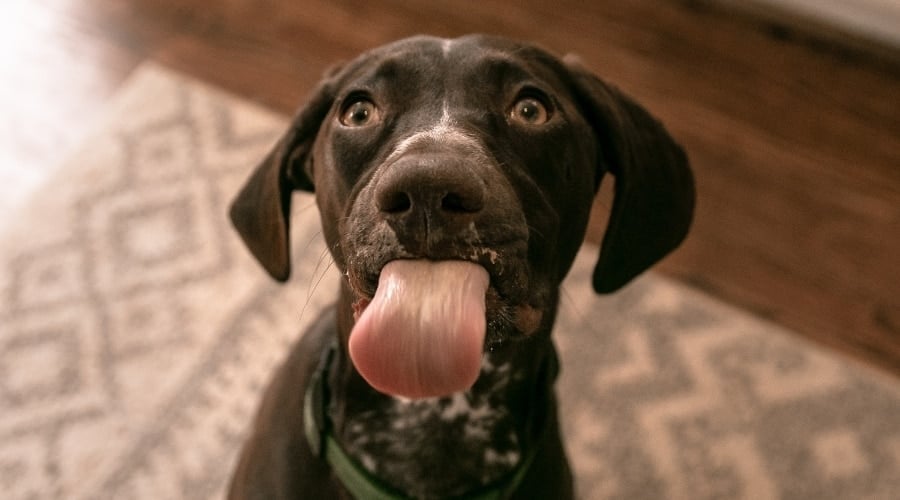
Xylitol = NOPE
Xylitol is an artificial sweetener found in some “sugar-free” peanut butter. It’s safe for humans but deadly for dogs. Even a small amount can cause:
- Sudden blood sugar crashes
- Seizures
- Liver failure
- Coma
It may also show up on labels as birch sugar or birch sap. The same poison, fancier name.
Still sold in:
- Protein Plus PB
- Krush Nutrition
- Go Nuts Co.
- P28 Foods
Double-check labels every time, even if you’ve bought it before. Brands can change formulas without warning.
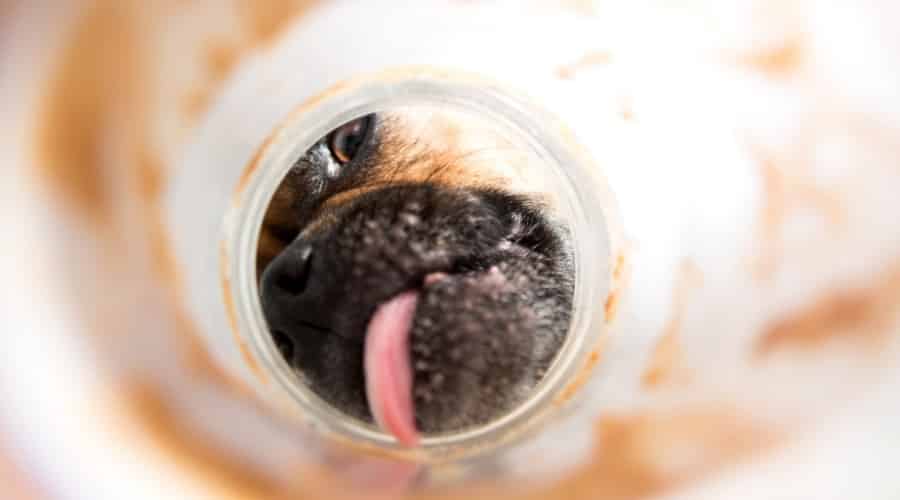
Also, Watch Out For…
- High sodium – Not great for dogs’ hearts or hydration
- Hydrogenated fats – These turn your pup’s treat into junk food
Choose natural peanut butter with minimal ingredients: just peanuts (and maybe a pinch of safe salt).
How to Pick a Dog-Safe Peanut Butter
Not all peanut butter is created equal, especially when your dog’s health is on the line. Here’s what to look for (and avoid) when shopping:
| Good Signs (Buy These) | Red Flags (Put It Back |
|---|---|
| Ingredients: Just peanuts (and maybe a pinch of salt) | Xylitol (or “birch sugar”) – toxic to dogs |
| No sweeteners like xylitol, birch sugar, or artificial anything | Excessive sodium |
| Low sodium | Artificial flavors or sugars |
| No added oils (hydrogenated = nope) | “Reduced-fat” or “sugar-free” blends – often full of sketchy fillers |
We’ve also reviewed and tested the best peanut butters for dogs to help you decide which one is best for your pup. Quick tip: If you wouldn’t eat it on a spoon yourself, don’t give it to your dog.
| Smooth | Chunky | Healthy Boost | Single Ingredient | With CBD |
|---|---|---|---|---|
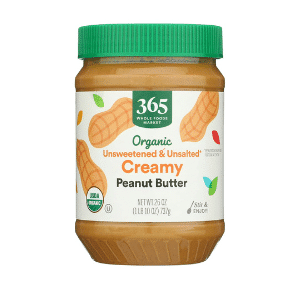 | 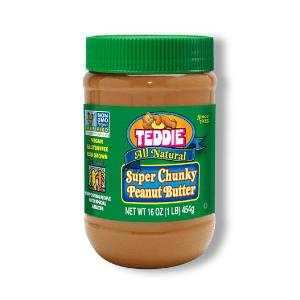 | 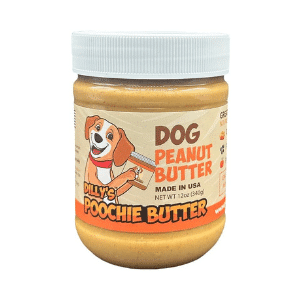 | 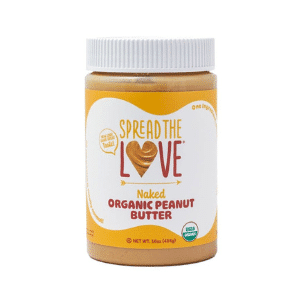 | 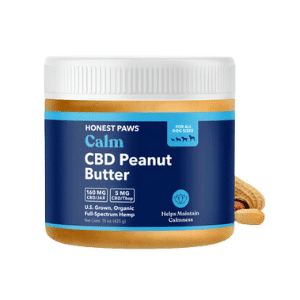 |
| 365 Organic | Teddie All Natural | Poochie Butter | Spread The Love | Honest Paws |
| View on Amazon | View on Amazon | View on Amazon | View on Amazon | Visit Website |
| Read Review | Read Review | Read Review | Read Review | Read Review |
Salt, Protein, or Sweet? What Dogs Actually Taste in Peanut Butter
Let’s bust some myths. No, it’s not just the salt. Or the protein. Or even the sweetness alone.
It’s the perfect storm of smell, texture, and that sticky “I will do anything for this” energy.
Is It The Salt?
Some folks think dogs go nuts for peanut butter because it’s salty. It makes sense; your pup does lick your fingers after you demolish a bag of chips. But here’s the twist: dogs don’t crave salt like we do.
They can taste it, sure, but not nearly as well. Humans have a full-on relationship with salty snacks. Dogs? It’s more of a casual acquaintanceship.
So, no, your dog isn’t chasing the sodium. They’re chasing something else (we’ll get there). In fact, too much salt can actually be dangerous for dogs, causing dehydration, vomiting, or worse.
Stick to the low-sodium stuff and save the salty cravings for your 2 a.m. popcorn binges. It’s not about the salt. Your dog has a more refined taste than that.
Is It The Protein?
Now we’re getting warmer. Dogs are meat machines. They evolved to sniff out protein like it is buried treasure, and peanut butter has just enough of that savory, nutty scent to set off their internal “snack alert” system.
Thanks to their super-sniffer noses, dogs can detect the protein content long before their tongues even get involved. While they may not be thinking, “Mmm, an excellent source of plant-based protein,” their instincts are screaming, “This smells like energy and survival!”
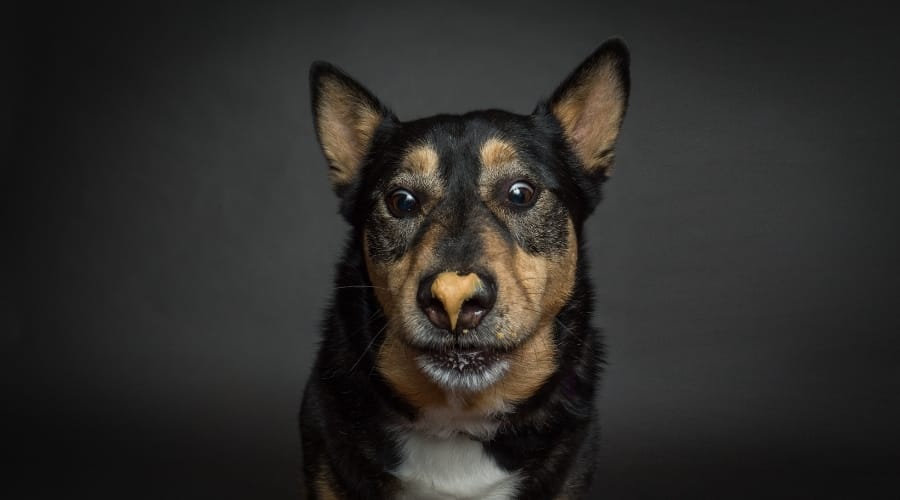
Bottom line: It’s not steak, but it smells close enough to trigger their ancient wolf brain. So yeah, protein is definitely part of the peanut butter magic.
Is It The Sweetness?
Surprise: dogs have a bit of a sweet tooth.
As omnivores, they evolved to enjoy sweet flavors because, back in the wild, sweet meant carbs, and carbs meant energy. Think ripe berries, fallen fruit, or, in this case, the sticky remains of a peanut butter sandwich.
So when your dog smells the faint sugary aroma wafting from the jar, they’re not just begging. They’re channeling their inner scavenger.
The takeaway? The sweetness in peanut butter hits that evolutionary jackpot. Combine that with the smell of protein and fat, and you’ve basically got doggy perfume.
How Much Peanut Butter Is Okay for Dogs?
Peanut butter is a tasty, nutritious treat, but it’s still a treat. Just like cookies for humans, moderation is key. While it does offer healthy fats and protein, it shouldn’t replace a well-balanced dog food diet.
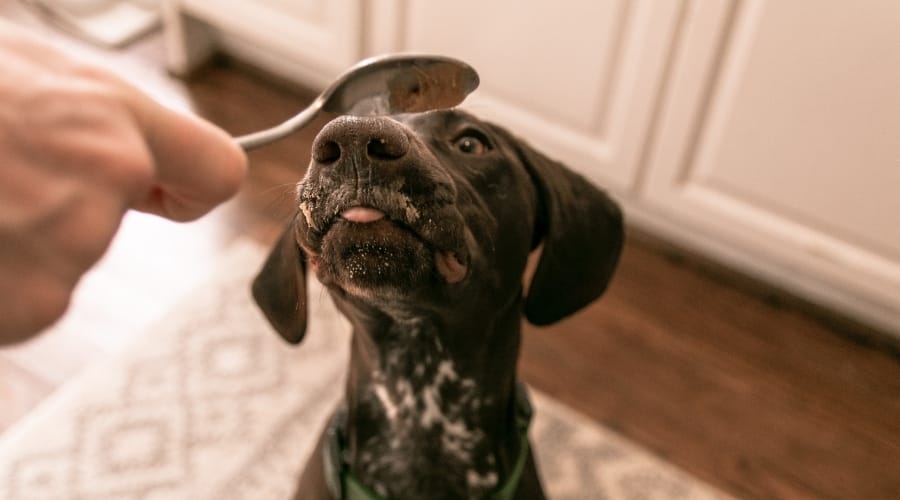
Follow the 10% Rule
Treats, including peanut butter, should make up no more than 10% of your dog’s daily calories. The rest of their nutrition needs to come from their regular food.
General Serving Guidelines
These are typical daily limits based on your dog’s size:
- Small dogs (under 25 pounds): ½ teaspoon to 1 teaspoon
- Medium dogs (25–50 pounds): ½ tablespoon
- Large dogs (50+ pounds): Up to 1 tablespoon
Always check the peanut butter label you’re using, especially if it’s high in fat or calories, and adjust the amount accordingly.
Special Considerations
Some dogs should have peanut butter only occasionally—or not at all. Limit to once a week if your dog has:
- A sensitive stomach
- A history of pancreatitis
- Diabetes
- Obesity
- Food allergies
If your dog has any health issues or dietary restrictions, it’s always a good idea to talk to your veterinarian before making peanut butter a regular treat.
Can Dogs Be Allergic to Peanut Butter?
Just like humans, dogs can have peanut allergies. While some veterinary professionals think it’s unlikely, some pet owners have reported signs of itching and irritation after their dogs consume anything with peanuts.
While violent peanut allergies may not be as common in dogs as they are in people, it is still a possibility to be aware of. If your dog has never had peanut butter before, start with a very small amount and keep an eye out for signs of a reaction.
7 Signs of a Peanut Allergy in Dogs
Each dog will have its own set of sensitivities, making it so important to be informed about the signs of allergic reactions in our pups. Any time you offer your dog a delicious peanut butter snack, we urge you to keep an eye out for the following symptoms. Some signs of an allergic reaction can include:
- Itching or scratching
- Red or irritated skin
- Swelling, especially around the face
- Hives
- Excessive licking or chewing on the skin
- Vomiting or diarrhea
- Lethargy or acting “off”
Mild reactions might just mean your dog has a sensitivity. But if you notice more severe symptoms—or anything that seems sudden and intense—it’s time to call your vet.
What to Do
If you suspect your dog has an allergy:
- Stop giving peanut butter immediately
- Monitor for worsening symptoms
- Contact your veterinarian for guidance
Some dogs with food allergies can still enjoy other treats with similar flavors or textures, so don’t worry. You still have plenty of safe snack options to explore.
Should You Feed Peanut Butter to Your Dog?
In most cases, peanut butter can be a fun, safe, and rewarding treat for your dog. It’s tasty, versatile, and full of healthy fats and protein.
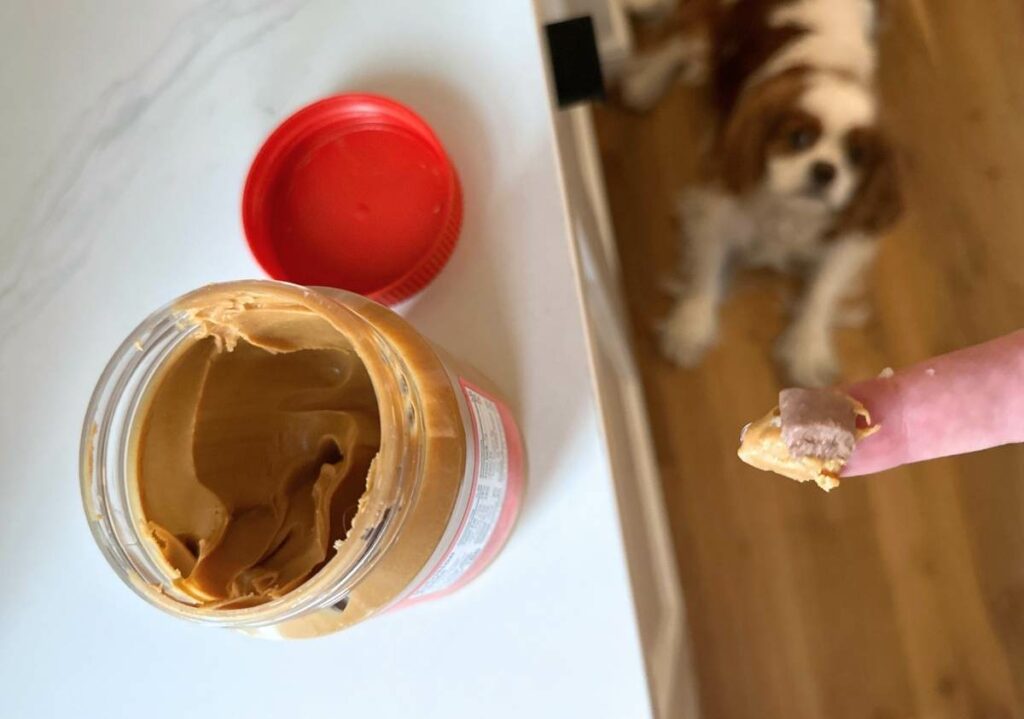
Whether you’re hiding a pill, filling a toy, or just offering a small spoonful for a job well done, peanut butter can be a great addition to your dog’s routine.
But like all treats, it comes with rules.
- Ensure the peanut butter you use is free from xylitol, artificial sweeteners, and unnecessary fillers. Choose natural brands with simple ingredients.
- Pay attention to portion sizes, and consider your dog’s needs, especially if they have sensitive stomachs, weight issues, or food allergies.
- Peanut butter should never be more than an occasional reward. Think of it as a bonus, not a staple.
When in doubt, check with your veterinarian to make sure it’s a good fit for your dog’s specific diet and health.
5 Easy Peanut Butter Treats Your Dog Will Love
So your dog’s a peanut butter fanatic, and now you know it’s safe (in moderation). Ready to level up from the basic spoon trick?
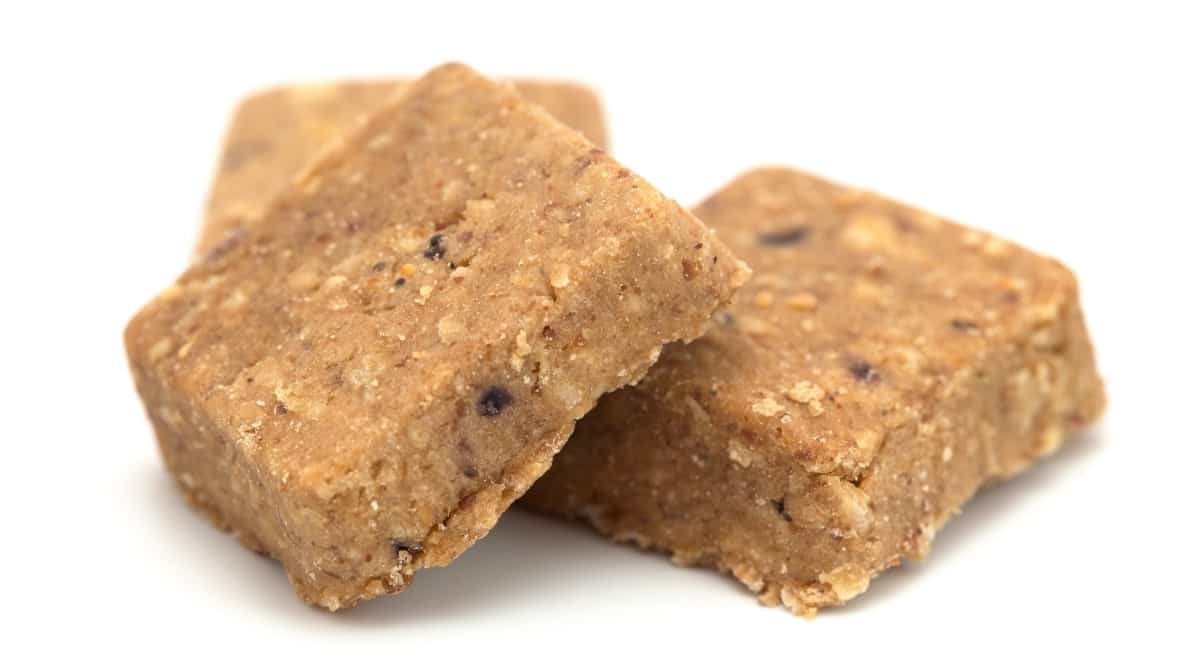
These simple, vet-approved recipes turn ordinary peanut butter into a boredom-busting, tail-wagging event. Whether you’re looking to cool your pup off with frozen bites or bake something special, these treats are perfect for rewards, training, or just because they’re cute.
Bonus: They’re easier than most human recipes. And your dog won’t judge you if they come out a little crooked.
1. Peanut Butter & Banana Biscuits
Ingredients:
- 1 ripe banana
- 1 cup peanut butter (unsweetened, no xylitol)
- 2 cups rolled oats
Instructions:
- Preheat oven to 350°F (175°C).
- Mash the banana in a bowl.
- Mix in the peanut butter and oats until a dough forms.
- Roll out the dough and cut it into shapes with cookie cutters.
- Bake for 15–20 minutes until golden brown.
2. Frozen Peanut Butter Pops
Ingredients:
- 1 cup plain yogurt
- 1/2 cup peanut butter
- 1/4 cup water or unsweetened applesauce
Instructions:
- Blend all ingredients until smooth.
- Pour into silicone molds or an ice cube tray.
- Freeze for 4–6 hours until solid.
3. Peanut Butter Kong Filler
Ingredients:
- 2 tablespoons peanut butter
- 1/4 cup plain yogurt
- A few pieces of your dog’s kibble or small treats
Instructions:
- Mix the peanut butter and yogurt in a bowl.
- Add kibble or treats for texture.
- Spoon the mixture into a Kong or similar toy and freeze for a long-lasting treat.
4. Peanut Butter & Pumpkin Biscuits
Ingredients:
- 1 cup canned pumpkin (unsweetened)
- 1/4 cup peanut butter
- 2 1/2 cups whole wheat flour
Instructions:
- Preheat oven to 350°F (175°C).
- Mix all ingredients into a dough.
- Roll out and cut into shapes.
- Bake for 20–25 minutes until firm.
5. Peanut Butter Pupcakes
Ingredients:
- 1/2 cup peanut butter
- 1/2 cup unsweetened applesauce
- 1 egg
- 1 cup whole wheat flour
- 1 teaspoon baking powder
Instructions:
- Preheat oven to 350°F (175°C).
- Mix peanut butter, applesauce, and egg.
- Gradually add flour and baking powder.
- Divide batter into a mini muffin tin or cupcake liners.
- Bake for 15–18 minutes.
Always ensure your peanut butter does not contain xylitol, as it’s toxic to dogs. Let me know in the comments if you’d like more ideas or variations! We’d also love to hear your dog’s peanut butter obsession stories.
Why Balanced Nutrition Matters for Your Dog
A healthy diet is the foundation of a long, happy life for your dog. That means high-quality proteins, the right mix of fats and carbs, and essential nutrients to support everything from joint health to digestion. Treats like peanut butter are great in moderation, but they should always support, not substitute, a balanced diet tailored to your dog’s size, age, and activity level. Whether you feed kibble, fresh food, or homemade meals, consistency and quality matter most.
Want to learn more about what a well-rounded diet looks like for your pup? Explore our guide to the healthiest dog food and how to keep your dog’s gut health in top shape.
